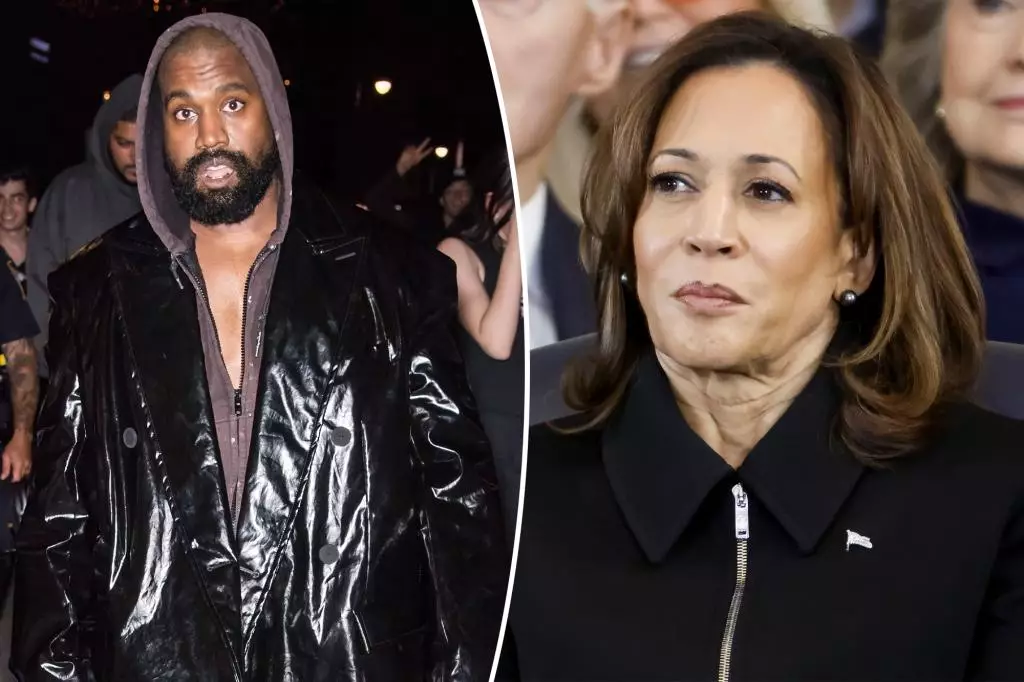Kanye West, a figure as contentious as he is talented, has once again stirred conversation with his provocative remarks, this time directed at former Vice President Kamala Harris. The incident sheds light on the complex interplay of celebrity culture, political discourse, and societal standards of accountability.
Recently, West’s post on X (formerly Twitter) where he graphically expressed a past desire for Harris—conflated with a disparaging remark about her political standing—has caused a backlash. His explicit comment, “I used to want to f–k Kamala until she lost. I don’t f–k losers anymore,” reflects a troubling tendency among public figures to disassociate personal admiration from political outcomes. The fact that he later claimed his deletion was influenced by Democratic pressure adds another layer of complexity, suggesting a battle of title and identity within community narratives.
It’s noteworthy that West, despite being a music powerhouse with 24 Grammy awards and not avoiding controversy, can still traverse into disrespectful territory with such casual cruelty against a prominent political figure. The casualness with which he dismisses Harris’s achievements further perpetuates toxic masculinity and objectification, drawing a thin line between political critique and personal disrespect.
Following the uproar, West posted subsequent messages that displayed both defiance and bravado, declaring, “The world is so lucky to have me,” and “Trump 4 life,” seemingly aimless proclamations wrapped up in a façade of comedic self-importance. It illustrates a disconnection with the wider implications of his words—messages that can embolden those who feel similarly yet may have less influence.
Kanye’s past—marked notably by his ban from social media platforms due to anti-Semitic remarks—highlights a pattern of behavior that not only challenges public discourse but also raises questions about the limits of freedom of speech. Should societal figures, especially those with as much visibility as West, be held accountable for their words when they undermine and demean others, especially women in positions of power?
West’s engagement in the drama of celebrity doesn’t stop with political figures. His ongoing feud with Taylor Swift encapsulates the chaotic intermingling of personal vendettas and public perception. This saga, which began in 2009 when West famously interrupted Swift’s acceptance speech at the MTV VMAs, symbolizes the eternal ramifications of celebrity interactions. He has openly remarked his history with Swift in his music, referring to her in a derogatory context, which further complicates their relationship and speaks to a deeper narrative of misogyny embedded within public figures’ interactions.
This enmity also exemplifies how public perception often becomes entertainment, painting West not just as a musical innovator but as a controversial public figure whose personal battles bleed into the broader cultural narrative. With Swift’s recent album featuring references that many speculate are about her interactions with West, the cycle of drama continues—feeding public fascination while simultaneously portraying the underbelly of celebrity culture.
As West navigates these interwoven worlds of politics, celebrity, and personal expression, the question of accountability remains salient. Celebrities wield a unique form of influence that carries weighty consequences. West’s dual role as an entertainer and cultural commentator prompts an assessment of how public figures must navigate their responsibilities toward society.
The expectation is not merely to provoke or entertain but also to serve as role models in various contexts. As society becomes increasingly aware of the implications of language and behavior, celebrities like West must contend with the repercussions of their public personas more than ever, possibly reshaping their approach to dialogue that encompasses respect and inclusivity.
The episode involving Kanye West, Kamala Harris, and the echoes of celebrity feuds acts as a microcosm of larger societal themes—identity politics, gender dynamics, and the weight of influence. The expectation of respect, even amid contention, remains an ongoing dialogue that both public figures and the audience must confront collectively.

